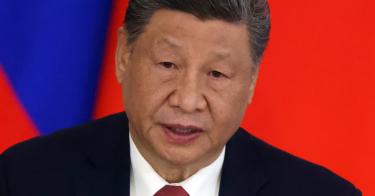They say the best lies contain grains of truth. That’s what makes Beijing’s disinformation about Taiwan so dangerous.
China has devised several misleading narratives about Taiwan that are designed to weaken America’s support for the island. It has been actively peddling these narratives in U.S. policy circles. U.S. officials must be prepared to recognize and counteract these falsehoods.
Three such narratives are especially pernicious.
The first is the false notion that cross-Strait tensions are entirely the fault of Taiwan’s “troublemaker” president, Lai Ching-te. To be sure, Beijing has grievances with Lai and his nativist Democratic Progressive Party (DPP). Lai has a history of pro-independence activism, and his speeches since becoming president have included statements viewed as provocative in China.
Beijing feels compelled to respond forcefully to perceived slights by Taiwan’s president to placate domestic audiences, so U.S. policymakers shouldn’t be surprised when Lai’s speeches spark aggressive military maneuvers.
>>> The Pentagon’s F/A-XX Fighter Mistake Could Cost America a War in the Pacific
But Lai has moderated his policies since running for president, and officials and academics from China know he lacks the authority to declare formal independence. In private conversations, they sometimes acknowledge not feeling threatened by Lai, and some believe the more controversial parts of his speeches are largely intended to appease radical elements of his political base. They’re probably right.
Tensions existed long before Lai entered the scene. His predecessor, Tsai Ing-wen, went out of her way early in her tenure to avoid antagonizing Beijing. But the Communist Party apparently decided having an enemy in the DPP that it could blame for its failures in Taiwan was more politically expedient than preserving cross-Strait stability.
The notion that Lai or his party is solely responsible for cross-Strait tensions is an attempt to create friction between the U.S. and Taiwanese governments. Beijing knows Trump doesn’t want unnecessary trouble and will go to great lengths to convince him Lai is making his job harder by stoking tensions with China. Trump must see through Beijing’s attempts to manipulate him and firmly support the government in Taipei, while having administration officials work quietly, behind closed doors, to address legitimate concerns with Taiwan’s government.
The second great lie is that the U.S. president can significantly reduce tensions over Taiwan by declaring support for peaceful unification. The Chinese agents peddling this proposal in Washington cleverly claim that, since peaceful unification lacks sufficient support in Taiwan to be a serious possibility, making such a declaration is a risk-free way to decrease tensions.
To be sure, the U.S. has a role to play in preserving peace and stability in the Taiwan Strait. To this end, it’s important for Trump to reiterate the longstanding policy of opposing any unilateral change to the status quo, whether formal independence or forced unification.
But a presidential statement declaring support for peaceful unification would be a dangerous step too far. Beijing would use such a statement to bolster its case that America’s support for Taiwan, including its arms sales to the island, is inconsistent with declared U.S. policy and commitments made to China. It would also use the declaration to manipulate Trump’s successors and the governments of other countries into also backing unification. While none of this on its own would immediately change how the U.S. and other countries engage Taiwan, it would contribute to Beijing’s effort to erode the island’s international legitimacy.
>>> America Must Fight Like an Insurgent To Defeat Communist China
The third false narrative Trump and his administration must watch out for is the notion that China will make any sacrifice necessary to seize Taiwan, and that it’s only a matter of time before it does so. This is perhaps the most dangerous narrative, one that many in the U.S. already embrace.
China cares more about Taiwan than most Americans do, so Beijing may well be willing to sacrifice more to seize the island than the U.S. would to defend it. But this is a far cry from saying no price is too high.
The only interest China’s leaders are prepared to pay any price for is staying in power, and even a successful military campaign against Taiwan could jeopardize this overriding interest if the economic and social costs are too high. China is only likely to take military action against Taiwan if its leaders are convinced either that they can easily win at a cost that wouldn’t threaten their political standing or that failure to act would threaten their hold on power.
The credible likelihood of U.S. involvement in any conflict over Taiwan minimizes the possibility that decisionmakers in Beijing will ever believe they can seize the island at a cost they’re politically able to bear. It is thus one of the greatest deterrents against Chinese military action.
The belief that no cost is high enough to dissuade China from attacking Taiwan once it has the military capability to do so logically leads to the conclusion that continued U.S. support for the island will mean eventually getting pulled into in a war against China—an outcome no rational American wants. If Beijing can lead enough opinion leaders to think this way over time, it believes it can convince U.S. policymakers to abandon the island.
This is the ultimate objective of Beijing’s disinformation campaign around Taiwan. The U.S. government must not fall for it.
This piece originally appeared in the National Security Journal



